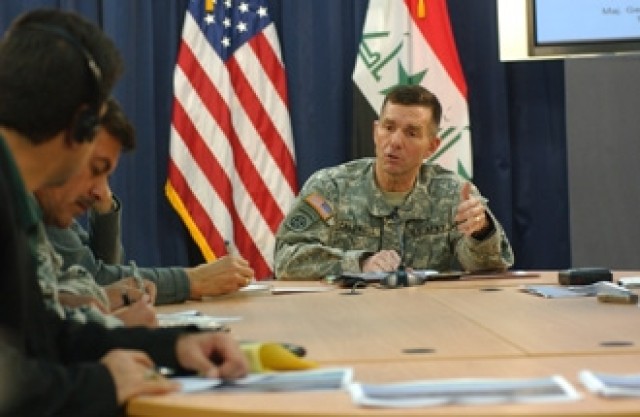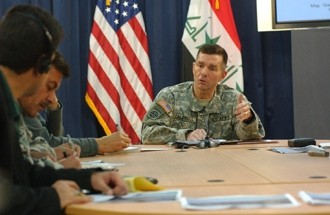BAGHDAD (Multi-National Force-Iraq, Dec. 14, 2006) - To aid the growth of Iraqi Security Forces the United States is increasing the amount of transition teams working with the ISF, the top military spokesman in Iraq said here Wednesday.
Commanders on the ground say transition teams are greatly enhancing the overall effectiveness of the ISF, said Maj. Gen. William B. Caldwell IV, Multi-National Force-Iraq spokesman, in a media roundtable with U.S. and Iraqi media at the Combined Press Information Center.
The real purpose of the transition teams "is to provide leadership and coaching and teaching and mentoring," said Caldwell. "The Iraqi Security Forces themselves are becoming much more proficient and capable now than they've been in the past."
The Iraqi Security Force is comprised of many junior leaders with little experience, so the daily influence of Coalition advisors is helpful in developing basic leadership skills, he said.
The plan is to "reduce the number of combat forces in order to increase the number of Military Transition Teams, because they see the benefit from that, because it has in fact made the Iraqi Security Forces more capable, more competent", said Caldwell.
"The challenge we have is they want to take greater control of their security," Caldwell said. "If that's a problem, it's a great problem to have on our hands -- that they want to assume greater control and be more responsible for their overall security. Our mission is to figure out how we can best help them achieve that as rapidly as we can."
There has been improvement in the little things we tend to take for granted, such as the amount of people showing up for work on a routine basis, care of weapons, and care of the people, said Caldwell.
"We're right at the mark of having put almost now 325,000 Iraqis through that program," he said. "The challenge is once you do that, you have to have continuing education, continuing mentorship, continuing development" - just as we do in our own Army.
Caldwell added that "When you have commanders on the ground at the lowest level, company commanders, young captains, young sergeants that are telling you that they see an improvement, that's probably one of the best measurements you can possibly use.


Social Sharing